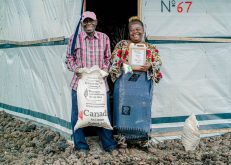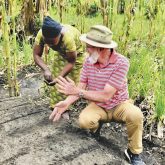The Canadian government’s commitments to humanitarian assistance is a “promising start” but not what was hoped for or needed, says the Canadian Foodgrains Bank.
“The federal government must make stable, adequate funding available for long-term development, to help lift the world’s poorest people out of poverty,” said Paul Hagerman, the Foodgrains Bank’s director of public policy in a news release late April.
“We know that even in the midst of this pandemic, many Canadians have remained generous, and would welcome Canada supporting a just and transformative recovery for all people in the world,” he added.
Read Also

Mazergroup’s Bob Mazer dies
Mazergroup’s Bob Mazer, who helped grow his family’s company into a string of farm equipment dealerships and the main dealer for New Holland machinery in Saskatchewan and Manitoba, died July 6 from cancer.
The Foodgrains Bank hoped to see two things, Hagerman told the Co-operator in a May 5 interview.
It wanted to see an increase to the base funding given to Global Affairs and other international development projects. Last year Canada put a lot of extra money toward international aid related to the COVID-19 pandemic — about $1.6 billion, of which an estimated $1.2 billion is new money, said Hagerman.
The Foodgrains Bank asked the federal government to add the $1.2 billion to the base funding, which it did not do — leaving the base funding at roughly $6.6 billion.
Second, the Foodgrains Bank hoped for a commitment to raise aid funding by $5.9 billion over the next three years to deal with the ongoing impacts of COVID-19, climate change, and needs of long-term development. The feds instead pledged $1.4 billion over five years.
Budget documents say Canada also pledged “an additional” $165 million in 2021 to 2022 to Global Affairs Canada, and a $1-billion increase to Canada’s loan commitment to the International Monetary Fund’s Poverty Reduction and Growth Trust.
However, more money may be on its way. Hagerman said aid and development organizations expected to see a new commitment to international climate finance as part of Canada’s participation in the Paris climate agreement. That wasn’t in the budget, but may be announced during a meeting of the G7 countries in June.
That plan will likely include money related to agriculture development because there’s a strong recognition from NGOs and Global Affairs that some of the biggest impacts of climate change are on food production and producers, said Hagerman.
As it stands, it’s not uncommon for the Canadian Foodgrains Bank to come to Global Affairs Canada with projects only to be told, “That is a great project. We would love to do that, but we don’t have money,” Hagerman told the panel.
Canada is doing less than its fair share, and worse than Canadians think when it comes to international aid and development, said a panel of global development leaders, including Hagerman, hosted by Engineers Without Borders on April 30.
Canada’s contribution to official development assistance (ODA) as a share of its economy has declined for two decades said Nicolas Moyer, CEO of Cooperation Canada. It’s reached its lowest point in 50 years, he said.
“As we have done consistently better as a country, as our well-being continues to rise, we’ve been investing less as a share of our economy into the well-being of others, and that’s a position that’s completely indefensible,” Moyer said.
Canada belongs to the Organisation for Economic Co-operation and Development (OECD) — a ‘club’ of wealthy nations that work together to address social, economic and environmental challenges. The OECD expects member nations to contribute 0.7 per cent of their gross national income, Hagerman told the Co-operator. Only a few countries hit that target. Canada gives about 0.27 per cent of its gross national income, which is below the average of OECD countries, he said.
Polling shows Canadians support international aid, said Moyer, but they also believe Canada does more than it actually does.
“We’re not the greatest,” Moyer said. “We’re actually well below average.”
Even as Canada spends hand over fist to combat COVID-19 domestically, the argument can still be made that international aid is good for us, said Hagerman.
The argument has always been that reducing conflict and disease elsewhere reduces the chance it comes here.
“That’s been really brought home this year during the pandemic with the idea that COVID’s not solved in Canada unless it’s solved everywhere,” Hagerman said.
The Foodgrains Bank has advocated for the federal government to increase its aid focus on agriculture because it can hit many of Canada’s aid goals like reducing gender inequality and helping countries adapt to climate change.
In developing countries women are often farmers, said Hagerman. Investing in farming means, “you’re helping to put money in (women’s) pockets, and helping to build their skills, and giving them stronger decision-making power in their families,” he said.
The Foodgrains Bank has seen some progress. In 2019 the federal government increased its investment in agriculture development by about $19 million, Hagerman said.
“That’s significant. That’s good news,” he said.




















